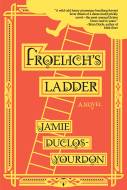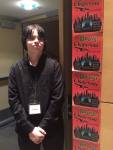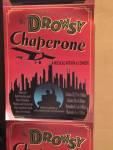Forest Avenue Press
15 things you may not know about Stevan Allred
Writer, teacher, and editor, Stevan Allred’s debut novel, The Alehouse at the End of the World, was published by Forest Avenue Press in November 2018. Since then, the book has exploded, recently hitting #4 on Powell’s bestseller list. Allred claims he has survived circumcision, a tonsillectomy, a religious upbringing, the 60’s, the War on Poverty, the break-up of The Beatles, any number of bad haircuts, years of psychotherapy, the Reagan Revolution, the War on Drugs, the Roaring 90’s, plantar fasciitus, the Lewinsky Affair, the internet bubble, the Florida recount of 2000, the Bush oughts, the War on Terror, teen-aged children, a divorce, hay fever, the real estate bubble, male pattern baldness, and heartburn. He has twice been nominated for a Pushcart Prize. A prolific writer, Allred’s work has appeared in numerous literary publications. He’s witty, talented, and hard-working. Here are some things you may not know about him.
1) Why did you become a Writer? How did you get started?
I got my first creative writing assignment in 5th grade, from Mrs. Bumgardner. Mrs. Bumgardner was one of those special teachers who changes your life, and even though I didn’t have the perspective to know that at the time, what I did know was that I adored Mrs. Bumgardner. She had me stand up and read my piece to the whole class, and she laughed at what I had written. Really laughed, not just being polite. I knew right then and there that making Mrs. Bumgardner laugh was exactly what I wanted to do in life, and writing was the way I could do it.
I take note, these decades later, that performance is involved in this story. I had to stand and deliver, and I got a nice response. To this day reading my work aloud to an audience, even an audience of one, is one of things I enjoy most in life.
2) What is your writing routine? How do you discipline yourself to keep at it?
I write early in the morning. I like the quiet. I like being up before dawn. I know that showing up is the one key thing that leads to any writing happening at all, so I show up.
That said, I allow myself some down time when I’ve finished a big project, and I don’t beat myself up if it takes some time before I’m ready to write again.
3) How many drafts before you feel the book is finished?
As many as it takes. I have written short stories that took two, or three, or four drafts to complete, and some that took eight or ten. I did three major drafts of my novel, The Alehouse at the End of the World.
4) What was the best thing that happened with regard to your writing career? The worst?
Best thing: having my first book, A Simplified Map of the Real World, published by Forest Avenue Press has to count as one of the best things, and now, with The Alehouse at the End of the World, I am the press’s first “repeat offender”.
Worst thing: I learned a long time ago not to dwell in regret. Don’t keep a list of the worst things–let the worst things go.
5) What part of your job do you love the most? Hate or dislike the most?
The hours I spend writing before the sun comes up are some of the best hours of my life. I try to find something to like about every single aspect of the job, and when I am vexed by some part of it, I remind myself how lucky I am to be living a life in which writing is important. I was raised to be modest and to not call attention to myself, so the publicity and marketing side of being a writer makes me a little uncomfortable at times, but that’s a small price to pay for having two books out.
6) What do you like to read? Do you read while working on a novel? Favorite authors?
I read constantly, and I have many favorite authors. I’m a huge fan of Michael Chabon. I’ve just read a really strong memoir, Stranger in the Pen, by Mohamed Asem–this is a must-read for anyone who wants to understand what it’s like to be treated as “other” in today’s hyper-politicized world. I love Alice Munro, Gabriel Garcia Marquez, Anthony Doerr, Annie Proulx. I just finished An American Marriage, by Tayari Jones–terrific novel. Right now I’m two thirds through Cai Emmons’ Weather Woman, and really digging it.
There are some writers whose voice is so particular and so strong that I avoid reading them when I’m working on a piece. Cormac McCarthy would be an example, as would Tom Spanbauer. I love their work, but it gets into my head and I start sounding like them.
7) What was the best advice you received as a writer? The worst?
I have a friend who’s a professional photographer. He told me one time (long ago, when cameras still used film) that the biggest difference between him and me as photographers was that he shot a lot more film. Writing is like that. You just keep doing it and doing it and gradually you get better. It takes most of us a long time to get to be good enough, years and years.
Worst advice: give up. This bad advice came from myself. Many years ago I got really discouraged about my writing, so I very quietly quit for two months. I didn’t tell anyone–I just stopped doing it. I thought I might be happier if I just stopped calling myself a writer–after all, I had nothing to show for it except a couple of short stories published in some very obscure journals. When friends and family asked me how my writing was going I felt embarrassed–who was I to call myself a writer? But after two months I was even more unhappy, so I started writing again. I called time on a novel I had worked on for five years, setting it aside, and I turned my attention to writing short stories. The stories I wrote then became A Simplified Map of the Real World.
8) Who has influenced you the most in terms of developing your personal writing style?
Close readings of writers I admire. I still read, as I always have, for entertainment and edification. But when I read now I always have a second track going in my head, one where I’m noticing how a writer is going about her business. Cai Emmons, for example, whom I’m reading now, has given us a superhero story in Weather Woman, but she treats her character’s story in completely realistic terms. She’s not ironic in any way, so her central metaphor, one of female empowerment, comes shining through with the seriousness it deserves. And Cai is a first class word nerd, something which I, as a fellow word nerd, really admire. I now know that “strigine”, for example, means ‘owl-like’. I can’t wait to use that one in a Scrabble game.
9) Do you have a good luck charm or superstition?
I have rituals and habits. I sit at a desk. I have an old-fashioned desk calendar, and I change the date and the day of the week before I start. I have a prayer I say before I write. I light candles.
10) If you weren’t a writer, what would you be?
Less neurotic.
11) What quote or personal saying do you live by?
Live and let live.
12) What’s next up for you, writing-wise?
I have extensive notes for another novel. I hope to begin soon.
13) If you could do anything over again, would you and what would it be?
Spend more time with my mother. She died suddenly 25 years ago. I still miss her.
14) What advice would you give beginning writers?
Be kind to yourself. Learn to live with your own bad writing. It is far easier to improve a bad sentence than it is to write a good one in the first place.
15) Something we don’t know about you?
I love wearing a tie, and I have a couple of hundred. Lately I’ve grown very fond of Crocs. I like my ties and my Crocs to color coordinate.
And: what would you like us to know about your latest release:
The Alehouse at the End of the World is widely available in bookstores and online. The audiobook, with me as the reader, came out December 18, and it’s a lot of fun.
Here’s what Publishers Weekly said about The Alehouse at the End of the World:
The fisherman is a simple man: he loves the sea and he loves his Cariña, from whom he’s been separated by time and shipwreck. Upon receipt of her final letter to him before her death, he embarks on a mythic hero’s journey to the Isle of the Dead, where he encounters shapeshifting birds, demi-deities, a legendary beast, and a snarky, narcissistic crow who fashions himself the king of the dead. What began as a quest to reunite with his lost love quickly becomes a battle for the survival of a spirit world, in whatever form that might take, and an examination of the divine. Sparked with risqué humor, the nearly Sisyphian questing of the fisherman devolves into a series of increasingly absurd and astonishing scenarios, all underscored with a strong thematic element of hope. Scholars of myth and lore, and readers prepared to be swept away on someone else’s trip (perhaps of the hallucinogenic variety), will be enthralled.
15 Things You May Not Know About Jamie Duclos-Yourdon
Oregon has so many talented writers. Take for instance Jamie Duclos-Yourdon. Jamie, a freelance editor and technical expert, received his MFA in Creative Writing from the University of Arizona. His short fiction has appeared in the Alaska Quarterly Review, Underneath the Juniper Tree, and Chicago Literati, and he has contributed essays and interviews to Booktrib. Froelich’s Ladder (Forest Avenue, August 2016) is his debut novel. He lives in Portland, Oregon. Here are some things you may not know about Jamie.
When I was a kid, my mom said to squeeze her hand if I ever saw anything unusual. She hoped to prevent an embarrassing observation (we lived in New York, after all; everything was unusual), but I spent my time scanning my surroundings—and if I couldn’t spot the obviously unusual thing, I’d identify the smallest discrepancy.
2) What is your writing routine?
I wake up at 4:30 every day and write for an hour. I usually manage 300+ words, which is slightly more than a page. It doesn’t feel like much, but if you keep at it every day—seven days a week, with no exceptions—the material builds up pretty quickly.
3) How many drafts before you feel the book is finished?
Oh, gosh … I probably go through four or five drafts before I’m ready to share a manuscript with a publisher or an agent, and those drafts have already been vetted by my writing group. If a publisher or agent is interested, then I’ll undertake another two or three drafts. The story is always evolving (and, hopefully, improving).
4) What was the best thing that happened with regard to your writing career?
Having my first five books rejected. Through Book #6, I was still doing my best Nick Hornsby impression—which isn’t necessarily a knock on Nick Hornsby. It took me a long time to recognize my own voice and even longer to trust it.
5) What part of your job do you love the most?
I love Q&As with an audience. Even if I’ve heard a question before—and more often than not I haven’t—the context is always different, the underlying assumption is different, my mood is different, everything is different. I learn something new every time.
6) What do you like to read? Do you read while working on a novel?
I’m always reading, whether or not I’m working on new material. I mostly stick to fiction, with a few news sources to keep me informed. I’m really picky, in terms of the former (and the latter, I suppose), and I don’t like to reread novels or short stories; additionally, I don’t feel guilty putting down a book after 50 pages. So my reading process is like no, no, no, no, no, YES, no, YES, YES, no, no, no …
7) What was the best advice you received as a writer?
A professor of mine once said, “Learn what you write and when you write.” If you write flash fiction, cool, write flash fiction. If you write 150,000-word novels, then do that instead. Don’t try to be something you’re not. Same goes for whatever time of day suits your creative process: find it and stick to it.
8) Who has influenced you the most in terms of developing your personal writing style?
I took a fiction workshop with Aurelie Sheehan when I was twenty-four. She read one of my short stories and said, “Oh, you write about responsibility!” That observation had a profound effect on my writing.
9) Do you have a good luck charm or superstition?
I’ve had a storyteller on my desk since 2001—a ceramic figurine of a Pueblo Indian, mid-story, surrounded by her children. I’ll be devastated when I eventually, inevitably drop and break her.
10) If you weren’t a writer, what would you be?
I have absolutely no idea. Drunk?
11) What quote or personal saying do you live by?
Samuel Beckett said it best: Try again. Fail again. Fail better.
12) What’s next up for you, writing-wise?
I’m currently at work on my tenth novel, a Mesopotamian ghost story about death and grieving and talking crows and ancient Sumer.
13) If you could do anything over again, would you and what would it be?
In January of 2002, an agent at ICM expressed interest in my first novel. I thought, “Yay, this is it! The big time!” and spent the next six months sitting on my ass. I’d love to get that time back.
14) What advice would you give beginning writers?
Read everything. Write constantly. Be on the lookout for a mentor. Don’t assume debt for an MFA. Find community and earn your inclusion. Success isn’t zero-sum. Listen to what your readers have to say. There’s nothing wrong with adverbs. Writers make boring protagonists. Know what your characters want and what prevents them from getting it. Study screenwriting to learn three-act structure. What seems natural and obvious to you is completely foreign to the rest of the world. You are a writer. You are a writer. You are a writer.
15) Something we don’t know about you?
I’ll be the Keynote Speaker at the 2017 South Coast Writers Conference February 17–18.
And: what’d you like us to know about your latest release:
Froelich nurses a decades-old family grudge from his permanent perch atop a giant ladder in this nineteenth century madcap adventure novel, Froelich’s Ladder. When he disappears suddenly, his nephew embarks on a rain-soaked adventure across the Pacific Northwest landscape to find him, accompanied by an ornery girl with a most unfortunate name. In their encounters with Confederate assassins, European expatriates, and a general store magnate, this fairytale twist on the American dream explores the conflicts between loyalty and ambition and our need for human connection, even at the highest rungs.
If you’re still scrambling to find the perfect Christmas present, consider Jamie’s new book from Forest Avenue Press.
Happy Holidays!
454 Days Later
I’ve been quiet and you probably think I fell into the ocean or got blown away by coastal storms. But no, I’m still here, learning all I can about my new home.
The reason I’ve been silent is that I’ve been busy. For a tiny dot on the map between Yachats and Lincoln City, Newport’s population is about the same as the town I left in Idaho. If you want a Costco or a Lowe’s you have to drive several miles, just like I did in Idaho. But unlike the town I left behind, there is so much more to do here I barely have time to read, let alone write.
Check out the latest issue of Oregon Coast Today and you will see there is always something going on. Add to that everything happening in The Valley between here and Portland and there is no time to be bored. Ever.
Take for instance last weekend. Since I don’t like to drive Portland traffic my son quietly obliged, taking me to Portland’s annual book festival Wordstock. I was so revitalized I’m still vibrating. My favorite author, Alice Hoffman, was in town and spoke about her new book Faithful. She even signed my copy and thanked me for stopping by. So many other talented writers attended, not to mention many Oregon presses including Ooligan Press, Tin House, and my favorite, Laura Stanfill from Forest Avenue Press. If that wasn’t great enough, admission to the event included admittance to the Portland Art Museum and the Andy Warhol exhibit. Now my son was vibrating, snapping pictures and studying one-of-a-kind art. Yes, it was raining. But in spite of the rain, it was a positive, energizing day.
That evening my family took in The Drowsy Chaperone, a musical put on by my grandson Dante’s high school class. The students were top notch, high energy, and amazing. The day ended with dinner at The Ram and a glass of wine. Perfect.
Many people told me I was crazy to move to Oregon. Several said I’d get depressed and miss the sun. And even though I miss my friends in Idaho, and sometimes I do miss the sun, mostly I love it here. Even when it’s raining.








